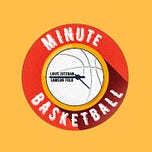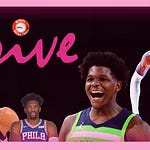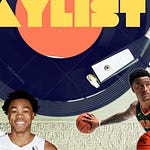addition to being a sports writer, I’m also an LSAT tutor. (What a condemnation of the industry that this author of a free Substack newsletter needs a second job!) As a tutor, I teach the difference between sufficient and necessary conditions. To illustrate the difference, occasionally I’ll use sleep.
You need sleep to have energy. It is necessary, a requirement, like food or sunshine. But it’s not always enough; it’s not, on its own, sufficient. These dark gray quarantine days mean energy is as easy to find as your own shadow. I wake up exhausted no matter how many hours I get. Sleep is needed, but it’s not enough.
For the desired result of having energy, you need both the necessary and the sufficient.
Sleep matters less to someone like me than the majority of people in the world. I don’t have kids. I can drink a pot of coffee, write my nonsense, and worry about the effects on my heart later.
For people whose jobs matter, sleep is far more essential. The NBA has countless symbiotic/parasitic industries (hello Minute Basketball!) but sleep science has to be one of the fastest growing. At the same time, sleep as a metaphor for lack of attention is always a hazard on the job. Fall asleep on the court, and you’ll be made a fool of. Sleep, in the life and death of a basketball player, on and off the court, is omnipresent.
This week in Minute Basketball: Sleep.
Folk - Dying
I listened to one podcast about sleep science and have been coasting off of a couple platitudes ever since:
Relative to how restorative sleep is for your brain, being awake is low-level brain damage.
The less you sleep, the earlier you die.
Could I tell you why those things are true (maybe they aren’t, I did what everyone does with something they don’t know intimately, I took a few taglines and ran with it) I couldn’t. However (comma) all the people in my life who text me around 8am and receive word back around 10am, know that I revere sleep - this is also exacerbated by the fact that most of my dearest friends live in Eastern time zones, and I do not.
Anyway, the opposite is true in the NBA. The more you sleep, the more damage you cause to your team's defense, and the less you sleep the longer you live. Of course “awake” defense can be kind of toothless depending on who is exacting it on the offense, but typically it creates more of a burden on the offensive players to beat the defense in a more meaningful way. What’s more frustrating than a great defensive possession blown up by a sneaky baseline cut to the dunker spot, or a ‘45’ cut against a weak-side zone? Basically nothing, save for Raptors players over helping on an assignment OG Anunoby clearly has under control.
You can fall asleep in a team concept, or in 1-on-1 defense. The team concept usually involves a back-cut, maybe some light relocation, or some sort of missed box-out. In a 1-on-1 sense, there are players who hypnotize and cast sleeping spells on players like the Sandman. After all, Kyrie Irving cascades across the court like Ramona Flowers skating through Scott Pilgrim’s dreams - you start hearing music, your eyes glaze over, and at the end of it all Kyrie tells you it was the most efficient means for him to get to the basket. I’m sure I could take this Scott Pilgrim thing a step further and include something about dying and extra lives, but that’s entirely too much work.
There’s an element of ‘avoiding the chase’ when guarding guys like Irving or James Harden - two players who feast on whipping out counters to how you might defend, so why not relax a little bit? In most cases Irving and Harden are just working their way to their favourite spots, noting the time on the shot-clock and getting comfortable, and the defenders are so locked into tracking them that they don’t notice they’ve been compromised by a newly available driving lane, passing angle, brush screen - whatever. It’s how Irving manages to maintain 50/40/90 splits even when he takes 6+ seconds of touch time on a possession. Most players’ statistics nosedive when they hold the ball for a long time - NBA2K even incorporated a feature of their game engine that penalizes shooting percentages the less you move the ball - and yet Irving persists because of his ability to navigate the REM cycle of defenses.
Harden manipulates that REM cycle for teammates more often. That’s not a comment on selfishness or anything like that - Harden is better suited to playmake because he reads the secondary levels of defenses better than almost anybody in the world, and he knows that they pay a great deal of attention to him - 5 pairs of toes pointed in his direction. It’s how the Nets have uncovered a new position for Bruce Brown (the 6’4” dunker spot dominator). A good eye for when to attack a sleeping defense, and a generational passer like Harden means that a player like Brown, who rarely self-creates (less than 25% of his 2-pointers, none of his threes) can take over half of his shots at the bucket and hit on nearly 69-percent of them. The conditions of this freakish Nets offense (built on the back of perhaps unparalleled offensive stardom) have created new and novel basketball permutations.
There’s a lot of ways to die on the basketball court, and few ways to live.
Zatzman - Living
Hamlet said “to die, to sleep -- to sleep, perchance to dream,” but he was also a cold-hearted prick who murdered his good friends Rosencrantz and Guildenstern for acting sketchy around him. Hamlet only illustrates that sleep has always existed squarely in the middle space between living and dying. If death is the long sleep, then life is the short one.
Where does that leave the NBA? For a decade, and probably longer, the league has been obsessed with sleep science.
Sleep deprivation...has become a way of life in the NBA.
Eighty-two regular-season games. Back-to-backs. Four games in five nights. Crisscrossing multiple time zones. NBA players are paid millions of dollars to push the limits of human performance, only to neglect the simplest and most effective tool.
"Sleep duration is important, but we also focused on the quality and timing of Andre's sleep," says Mah, who consults with teams in the NFL, MLB, NHL, and NBA—including the Warriors—on sleep and recovery strategies. "We worked on his caffeine intake, his nutrition, his wind-down routine. Big picture, we worked on his whole approach to sleep, to make it more of a priority."
Did it work? Sample size of one and all that, but boy, did it ever seem to: With more sleep, Iguodala's three-point-shot percentage doubled. His points-per-minute spiked 29 percent. His turnover and foul rates fell 37 and 45 percent, respectively. His coaches gave him more game time, and, in the 2015 Finals, tasked him with guarding Cleveland Cavaliers powerhouse LeBron James. The Warriors went on to win the series. Iguodala received the Most Valuable Player award.
So how much sleep do NBA players get per night during the season? Ballparking a figure is tricky, but Czeisler, who has worked with three NBA teams, says five hours per night is not an uncommon answer from players; he's had "very famous" players tell him that they sleep only three to four hours a night. Multiple factors contribute to this sleep deficit, not least the siren song of the NBA nightlife (though the "Tinderization" of the NBA has arguably minimized that effect). That said, one former and four current NBA athletic training staff members all separately say that six hours of sleep per 24-hour cycle is common among players, an estimate that combines the nightly sleep and the pregame nap that is typical for many NBA players.
All three articles point to the same studies about sleep deprivation and the same impacts on the same NBA players. Dr. Cheri Mah’s original study, by the way, was done in 2011, so it’s not like the idea that NBA players need to sleep more is new.
All this talk of sleep deprivation in the NBA leads to the obvious question, which isn’t fully answered in the series of articles: why don’t NBA players sleep more?
Some of the reasons are obvious. Both in terms of quantity and quality, NBA players work far harder than the average human, often to all hours of the night. They work weekends. They fly across the country every other day during busy stretches. The league tried to cut down on travel over the previous decade, reducing back-to-backs, to help address the sleep deficit, but this season has reversed all of the good work and then some. It’s hard to have a consistent sleep schedule when you don’t have a consistent work schedule.
That’s not the whole story, of course. Players could just … sleep more. Go to bed early after games and practices. And many choose not to. That’s not a bad thing, but it is revealing about the mythos on which the league rests.
Many players are too busy living. Players have children, families. They have charities and foundations with demands on their time. They have cities to explore, teammates with whom to bond, and restaurants to frequent. They have video games to play and, yes, clubs to frequent. You’re only a millionaire 20-year-old for so long. The idea that NBA players need to subordinate their entire lives to their work is ridiculous. Even LeBron James, famous for his seven-figure annual budget for his physical recovery, has a life. Remember Taco Tuesday?
Sleep deprivation is not unique to NBA players. I myself, covering NBA games at night and tutoring early in the morning on many days, only sleep five or six hours some nights. I don’t need to compete at the highest level in the world for my job, so it’s apples and oranges, but the point is that life gets in the way for all of us.
Sleep deprivation is of course bad, but it’s common across the board in our society. That NBA players share some of the same problems as their fans is not an inherently bad thing. But the idea that NBA players should sacrifice everything is ridiculous. Even if Jimmy Butler does work at 3 am in the morning, he still lives his life in between those hours. Players don’t live in the gym, and nor should they. They have huge amounts of pulls on their time in every direction. Sometimes sleep takes a backseat. Yes, teams and players are always trying to find thinner and thinner margins for advantages. Sleep falls in that category, but players can’t give everything. That would make them robots, would make them not living at all. You may as well be dead if putting a ball through a rim is the only element of your life. So what’s sleep deprivation for the hard-working 20-something-year-olds in the NBA?
Just proof that they’re alive.














Share this post